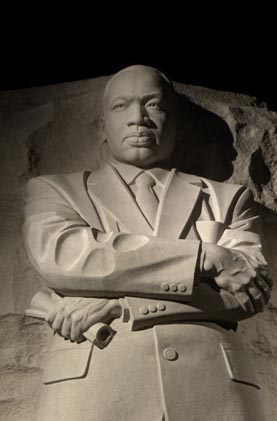
(photo by Scott Ableman)
DR. MARTIN LUTHER KING JR.’S BIRTHDAY (BELOVED COMMUNITY DAY)
CULTURAL RESOURCES
Sunday, January 20, 2013
Brian Bantum, Lectionary Team Cultural Resource Commentator
I. Historical Document
The prophetic tradition of the black church has a long and rich legacy. When slaves converted to Christianity, they quickly saw a stark difference between the character of God in Scripture and the “God” so often preached by the preachers of the slaveholders. The prophetic tradition of these Christian slaves sought to point out this gap and call all Christians to obedience to God’s love and lordship. Some examples of this tradition can be seen in David Walker, Harriet Tubman, Sojourner Truth, Frederick Douglass, and Jarena Lee.
David Walker was one of the earliest examples of African American Christians who courageously called white American Christians to account for the gap between “slave Christianity” and their oppression of African slaves. In 1830 he wrote:
My dearly beloved Brethren and Fellow Citizens. Having travelled over a considerable portion of these United States, and having, in the course of my travels, taken the most accurate observations of things as they exist—the result of my observations has warranted the full and unshaken conviction, that we (coloured people of these United States) are the most degraded, wretched, and abject set of beings that ever lived since the world began; and I pray God that none like us ever may live again until time shall be no more. They tell us of the Israelites in Egypt, the Helots in Sparta, and of the Roman Slaves, which last were made up from almost every nation under heaven, whose sufferings under those ancient and heathen nations were, in comparison with ours, under this enlightened and Christian nation, no more than a cipher—or, in other words, those heathen nations of antiquity, had but little more among them than the name and form of slavery; while wretchedness and endless miseries were reserved, apparently in a phial, to be poured out upon our fathers, ourselves and our children, by Christian Americans!1
Dr. Martin Luther King Jr. was a vital part of a rich legacy of African American protest which sought to prophetically declare God’s desire for justice.
II. Biographical Background
Martin Luther King Jr.’s legacy stands as an indelible mark of hope, tenacity, and love. Most notably, his speech on the steps of the Lincoln Memorial in 1963 continues to ring for many as a prophetic call to extend freedom to all. In a nation that claims that its foundations lie in freedom, this was and is a powerful call.
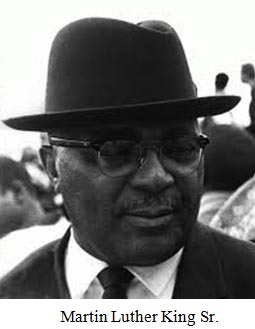 |
Dr. King was born in 1929 to a ministerial legacy. His maternal grandfather, A.D. Williams, and his father were both minsters of the famed Ebenezer Baptist Church in Atlanta. Here King was nurtured in a womb of faith. The mode of faith modeled by his father and his congregation was not passive, however. Ebenezer Baptist and King Sr. exhibited a faith that was engaged in the everyday struggle for dignity that all African Americans faced in mid-20th-century America.
Whether boycotting newspapers or organizing to provide economic assistance for parishioners, King Sr.’s pastoral role was never isolated from the everyday realities of his congregation. This model of engagement is an echo of a particular tradition within the black church that emphasized the church’s role in both resisting the political and social realities of a racist society as well as speaking defiantly against such injustices. In a society where African American access to health care, education, and may other basic aspects of American life was severely limited by racist policies, African American churches often served to alleviate these gaps serving a wide variety of needs for the African American community. In doing so, these churches resisted the social oppression the dominant political and social system sought to impose. |
Dr. King’s calling to ministry arose out of this particular tradition of the black church where being a disciple required one to be engaged in the civic process and respond to the injustices that confronted one’s community.
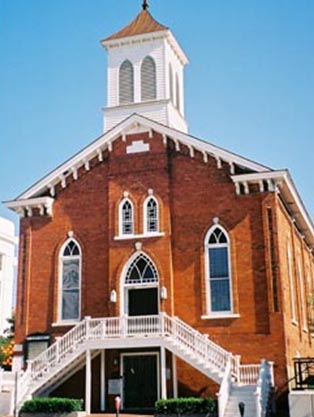
Dexter Avenue King Memorial Baptist Church
It was in Birmingham, Alabama, during his pastorate at Dexter Avenue Baptist Church that one such injustice, the segregation of public buses, would be challenged by King’s congregation as well as a network of African Americans (Christian and non-Christian alike). This movement marked a period of civic engagement and protest that followed a long tradition of African American Christian protest. In King’s view, acts of protest were necessary to follow Christ and King. He was critical of both the larger social stance towards African Americans, but also how Christians in particular (both black and white) seemed unwilling to enter into active protest against the injustices of the American racial system. In his famous “Letter from a Birmingham Jail” he wrote to his fellow clergy, responding to the charge that his activities were too radical. He wrote:
I am in Birmingham because injustice is here. Just as the prophets of the eighth century B.C. left their villages and carried their “thus saith the Lord” far beyond the boundaries of their home towns, and just as the Apostle Paul left his village of Tarsus and carried the gospel of Jesus Christ to the far corners of the Greco Roman world, so am I compelled to carry the gospel of freedom beyond my own home town. Like Paul, I must constantly respond to the Macedonian call for aid.2
In the midst of King’s participation within the long tradition of the black church’s prophetic presence, King’s theological vision also articulated a hope for the whole of society that society would become a “beloved community.” This belief was grounded in the conviction that God desired humanity’s participation in creating peace and reconciliation within society. Because of this, non-violence was a necessary aspect of faithfully standing against injustice even while strongly declaring the unrighteousness of an institution or social situation.
King’s political presence throughout the 1950s and 1960s also displayed definite beliefs about human possibility and the inherent dignity of all people. These political activities were grounded in and exercised through his vocation as a pastor and as a disciple of Christ. From this vantage point, King was not simply a brilliant orator or public advocate but was representative of a rich heritage of African American Christian thought and action, with King’s own political rhetoric and strategies representing a unique improvisation upon the heritages of various aspects of American Christianity.
In his superb collections of sermons, Strength to Love, King wrote of the need for Christians to “blend opposites.” He wrote:
Jesus recognized the need for blending opposites. He knew that his disciples would face a difficult and hostile world, where they would confront the recalcitrance of political officials and the intransigence of the protectors of the old order. He knew that they would meet cold and arrogant men whose hearts had been hardened by the long winter of traditionalism. So he said to them, ‘Behold, I send you forth as sheep in the midst of wolves.’ And he gave them a formula for action, ‘Be ye therefore wise as serpents, and harmless as doves.’ It is pretty difficult to imagine a single person having, simultaneously, the characteristics of the serpent and the dove, but this is what Jesus expects. We must combine the toughness of the serpent and the softness of the dove, a tough mind and a tender heart.”3
King’s own biography reflects this perpetual blending of opposites seeking creative new ways to engage the challenges of his community and the nation. The very idea of a beloved community envisioned a community of people who could re-imagine themselves together in new ways, following Jesus into dangerous places for the sake of the community’s thriving.
III. Story or Illustration
As a child, I had always seen images of Dr. Martin Luther King, Jr. associated with the march on Washington and the Civil Rights movement. In many ways, I saw him as a wonderful man whose sphere was purely the political and who sought to see laws changed so that everyone could have equal rights. All of this was true, of course, but when I was in college, I discovered a collection of King’s sermons. It was during a course on the history of Christianity and during this class that I came to understand the depth of King’s Christian faith as the impetus for his political action.
In these sermons, I heard a man animated by a conviction that “God Is Able” and that God calls us to participate in the work God is doing in the world. Studying the history of the church’s involvement (and often lack thereof) in the Civil Rights movement, I was struck at how revolutionary King’s sermons were not only for non-Christians, but perhaps even more convicting and challenging for those who professed to be followers of Christ.
King was a complicated and flawed man in many ways. Studying and writing about his legacy has brought to mind just how un-heroic so many of our nation’s heroes are. At the same time, King’s conviction that God desired justice for all of God’s children, his willingness to walk along a dangerous road, to hold together a “tough mind and a tender heart,” has constantly challenged me to ask how my faith has sought to serve God’s purposes among those who seemingly have no voice in our current society, to ask myself if I am using the resources I have, and to which I have access, to advocate for others in the hopes that God’s beloved kingdom might be known.
IV. Songs for This Lectionary Moment
I’m Gonna Live So God Can Use Me
I’m gonna live so God can use me
Anywhere, Lord, anytime!
I’m gonna live so God can use me
Anywhere, Lord, anytime!
I’m gonna work so God can use me
Anywhere, Lord, anytime!
I’m gonna work so God can use me
Anywhere, Lord, anytime!
I’m gonna pray so God can use me
Anywhere, Lord, anytime!
I’m gonna pray so God can use me
Anywhere, Lord, anytime!
I’m gonna sing so God can use me
Anywhere, Lord, anytime!
I’m gonna sing so God can use me
Anywhere, Lord, anytime!4
We Shall Overcome
We shall overcome, we shall overcome,
We shall overcome someday;
Oh, deep in my heart, I do believe,
We shall overcome someday.
The Lord will see us through, The Lord will see us through,
The Lord will see us through someday;
Oh, deep in my heart, I do believe,
We shall overcome someday.
We’re on to victory, we’re on to victory,
We’re on to victory someday;
Oh, deep in my heart, I do believe,
We’re on to victory someday.
We’ll walk hand in hand, we’ll walk hand in hand,
We’ll walk hand in hand someday;
Oh, deep in my heart, I do believe,
We’ll walk hand in hand someday.
We are not afraid, we are not afraid,
We are not afraid today;
Oh, deep in my heart, I do believe,
We are not afraid today.
The truth shall make us free, the truth shall make us free,
The truth shall make us free someday;
Oh, deep in my heart, I do believe,
The truth shall make us free someday.
We shall live in peace, we shall live in peace,
We shall live in peace someday;
Oh, deep in my heart, I do believe,
We shall live in peace someday.5
Freedom Is Coming
Oh freedom,
oh freedom,
oh freedom,
freedom is coming,
oh yes oh freedom,
Oh freedom,
oh freedom,
freedom is coming,
oh yes oh
Yes I know,
oh yes I know,
oh yes I know,
oh yes I know,
oh yes I
Yes I know,
oh yes I know,
oh yes I know,
oh yes I know,
oh yes I know.
Oh Jesus,
oh Jesus,
oh Jesus,
Jesus is coming,
oh yes oh Jesus,
Oh Jesus,
oh Jesus,
Jesus is coming,
oh yes oh
Yes I know,
oh yes I know,
oh yes I know,
oh yes I know,
oh yes I
Yes I know,
oh yes I know,
oh yes I know,
oh yes I know,
oh yes I know.6
V. Memorable Learning Moment
To make this day a memorable learning moment consider:
- Reading excerpts or beginning a small group study of one of King’s sermons;
- Connecting the biblical call to follow Christ with a particular challenge facing the local church community by praying a psalm with a particular school or neighborhood as the focus;
- Having congregation members anonymously write their own “Jericho roads,” the places they are afraid to go, but perhaps God is asking them to go, on Post-It notes or larger posters. These places can be prayed for, exchanged, or used for future discussion about what the church can do to participate in advocating for and seeking justice for those in their community.
VI. Audio Visual Aids
Sermons and Speeches
Additional Resources
- The King Center has a vast collection of King’s sermons, letters, and articles. The site can be searched using key words or titles. www.thekingcenter.org
Further Reading
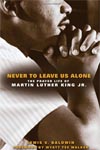 |
Baldwin, Lewis. Never to Leave Us Alone: The Prayer Life of Martin Luther King, Jr. Minneapolis, MN: Fortress Press, 2010. |
|
|
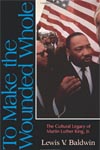 |
Baldwin, Lewis. To Make the Wounded Whole: The Cultural Legacy of Martin Luther King, Jr. Minneapolis, MN: Fortress Press, 1992. |
|
|
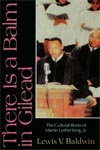 |
Baldwin, Lewis. There Is a Balm in Gilead: The Cultural Roots of Martin Luther King, Jr. Minneapolis, MN: Fortress Press, 1991. |
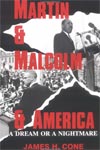 |
Cone, James H. Martin & Malcolm & America: A Dream or a Nightmare. Maryknoll, NY: Orbis Books, 1992. |
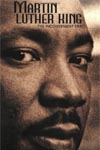 |
Harding, Vincent. Martin Luther King: The Inconvenient Hero. Maryknoll, NY: Orbis Books, 2008. |
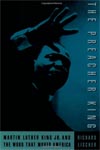 |
Lischer,Richard . The Preacher King: Martin Luther King Jr. and the Word that Moved America. New York: Oxford UP, 1995. |
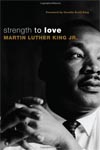 |
King, Martin Luther, Jr. Strength to Love. Minneapolis, MN: Fortress Press, 2010. |
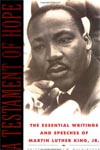 |
King, Martin Luther, Jr. A Testament of Hope: The Essential Writings and Speeches of Martin Luther King, Jr. Ed. James Washington. New York, NY: HarperOne, 1990. |
Notes
1. David Walker. Appeal to the Colored Citizens of the World. New York: Hill and Wang, 1965, 1.
2. Martin Luther King, Jr. “Letter from a Birmingham Jail” in A Testament of Hope: The Essential Writings and Speeches of Martin Luther King, Jr. San Francisco: HarperCollins, 1986, 290.
3. Martin Luther King, Jr. “A Tough Mind and A Tender Heart,” in Strength to Love. Philadelphia: Fortress, 1963, 13–14.
4. “I’m Gonna Live So God Can Use Me.” African American Spiritual.
5. “We Shall Overcome.” Traditional Protest Song.
6. “Freedom Is Coming.” Freedom Is Coming: Songs of Protest and Praise from South Africa (Collection). Arranged by Anders Nyberg. Wild Goose Publications, 2004.
|